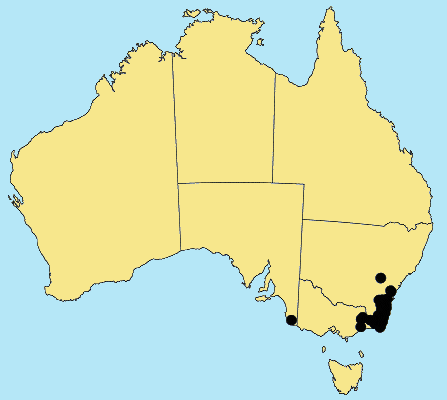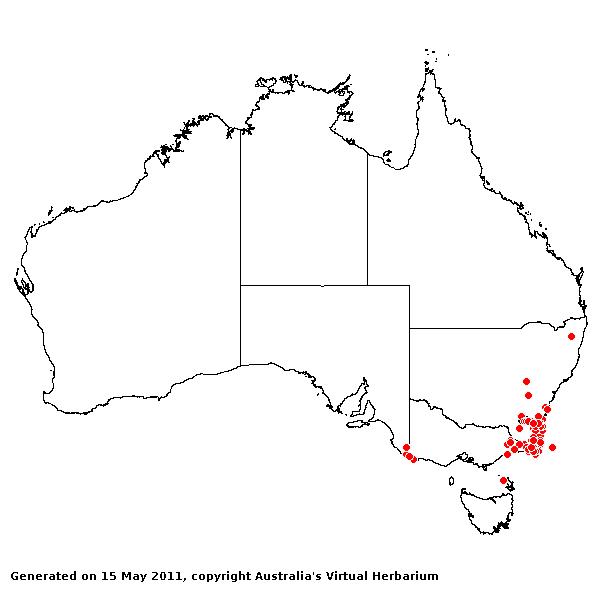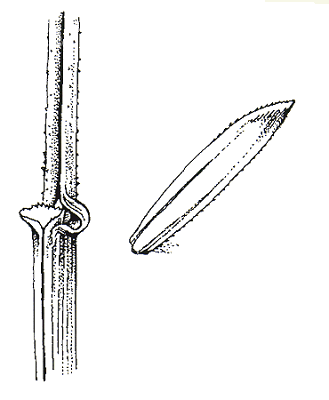Poa meionectes Vickery. Contr.
New South Wales Natl Herb. 4: 250 (1972).
Classification.
(GPWG 2001) : Subfamily Pooideae. Tribe Poeae.
Basionym and/or
Replacement Name: Poa exilis
Vickery, Contr. New South Wales Natl. Herb. 4: 212 (1970).
Type of Basionym or
Protologue Information: Australia: New South Wales: Tantawanglo Mt.: on
hill w of 6-mile Cr.: 7 Jan 1959, J. Vickery (HT: NSW 50163).
Recent synonyms:
P. exilis.
Key references
(books and floras): [2002] D.Sharp & B.K.Simon, AusGrass, Grasses of
Australia, [2006] J.Jessop, G.R.M.Dashorst, F.M.James, Grasses of South
Australia (153), [2008] S.W.L.Jacobs, R.D.B.Walley & D.J.B.Wheeler, Grasses
of New South Wales (352), [2009] A.Wilson (ed.). Flora of Australia,
Vol 44A. Poaceae 2 (322).
Illustrations:
[2006] J.Jessop, G.R.M.Dashorst, F.M.James, Grasses of South Australia (153, fig. 106), [2008] S.W.L.Jacobs,
R.D.B.Whalley & D.J.B.Wheeler, Grasses of New South Wales, 4th edn
(352), [2009]. A.Wilson (ed.), Flora of Australia 44A: Poaceae 2
(323, Fig. 43).
Habit.
Perennial. Culms 10–100 cm tall, 2 -noded. Lateral branches simple. Leaves
mostly basal. Leaf-sheaths smooth or scaberulous, glabrous on surface. Ligule
an eciliate membrane or a fringed membrane, a ciliolate membrane, 0.4–2 mm
long, abaxially hairy, truncate. Leaf-blades flexuous, filiform, conduplicate
or involute, 5–21 cm long, 0.2–0.5 mm wide. Leaf-blade surface scaberulous,
glabrous.
Inflorescence.
Inflorescence compound, a panicle. Panicle elliptic, 1–17 cm long.
Spikelets.
Spikelets pedicelled. Fertile spikelets many flowered, with at least 2 fertile
florets (2–4(-6)), comprising 2–4(–6) fertile floret(s), with diminished
florets at the apex, oblong, laterally compressed, 2.9–8 mm long.
Glumes. Glumes
similar. Lower glume oblong, membranous, keeled, 1-keeled, 3 -nerved. Upper
glume oblong, 1.5–3 mm long, membranous, keeled, 1-keeled, 3 -nerved.
Florets.
Fertile lemma 2–3.5 mm long, keeled, 5 -nerved. Lodicules present. Anthers 3.
Continental
Distribution: Australasia.
Australian
Distribution: South Australia, New South Wales, Victoria.
South Australia:
South-eastern. New South Wales: South Coast, Southern Tablelands. Victoria:
East Gippsland.
Notes.
Close to P. clivicola but leaves finer and less rigid, and glumes
smaller.
Endemic. . Usually in
cool, open eucalypt woodland. Flowers Sept.-Feb. Fruits Mar.




